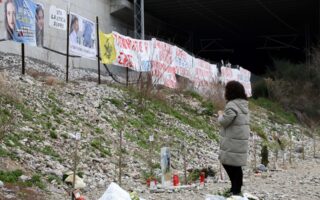The story behind the Parthenon Project
The background of the initiative and the contacts in London and Athens fighting for the return and reunification of the marbles

It was the first official event of the Parthenon Project in Greece, a campaign that aims to reunite the Parthenon Marbles currently at the British Museum in London with their counterparts in Athens. At the end of September, the Lefa family – John, Maria and their daughter Melissa – who founded and are financing the project, traveled to Athens from abroad where they live to welcome their speakers who arrived from the United States, Australia and the United Kingdom. Everyone was given a guided tour of the Acropolis Hill and later they presented a panel discussion, attended by Foreign Minister George Gerapetritis and Culture Minister Lina Mendoni, on some of the positions and proposals “for a mutually beneficial solution.”
John Lefas spoke for the first time publicly about his plans, but the “odyssey” – as he described the whole effort – started at the beginning of 2018. Since then, he has been quietly – almost nonstop – dealing with the Parthenon Project. Kathimerini reveals some aspects of little-unknown but effective campaign.
‘Meteorite’
It was in 2020 when Lefas first walked into the Maximos Mansion, the Greek prime minister’s office, to meet members of the government (among them George Gerapetritis, then minister of state). Getting an appointment with the PM was no mean feat. Lefas, originally from Thessaloniki, had left in 1975 for Canada, created a successful plastics industry there, but was completely unknown in Greece. “A meteorite,” as he jokingly calls himself. He had, however, done something that finally caught the attention of the government. He had financed the publication and promotion of the book “Who Owns History?: Elgin’s Loot and the Case for Returning Plundered Treasure,” by leading human rights lawyer Geoffrey Robertson.
“I had done it in the hope that they would include the issue of the marbles in the agreement in view of Brexit. For this purpose I had sent 5,000 copies of the book to members of the Anglican Church, British MPs, and also MEPs,” he explains. He didn’t achieve his original goal, but he saw that the book had an impact and continued to send copies. One of the recipients was Greek Prime Minister Kyriakos Mitsotakis, who received the book with Robertson’s personal dedication for “the sculptures to be returned during his premiership.”
In that first meeting at the prime minister’s office, Lefas told his interlocutors how his involvement began, completely by accident, one evening in 2018. He had read that the then SYRIZA administration had decided not to utilize the work of Robertson, Norman Palmer and Amal Clooney, the three lawyers who (during the premiership of Antonis Samaras) had researched and drafted a comprehensive legal proposal to claim the marbles. He found a summary of their proposal online, read it, and before going to bed e-mailed one of the three attorneys, Geoffrey Robertson. “Could I, as a Greek citizen, take legal action and claim their return?» he asked. Robertson replied the same evening that “that would be a particularly bad idea.” Despite all this, Lefas had piqued the lawyer’s interest and he agreed to meet in the Duveen Gallery of the British Museum. “I felt a tightness entering this windowless box of a room. It’s as if they are locked in a tomb,” Lefas recalls.
The two men could not be more different. Robertson is eccentric, with a wry sense of humor, and an eloquent speaker with a thunderous voice. Lefas, with a strong Greek accent, speaks softly and quickly in a particularly low tone. But they have since joined forces with a common goal. “Robertson is definitely more belligerent than I am. I would say he is our army. Every country should have an army, you just hope you don’t have to use it,” he tells Kathimerini with a laugh.
‘It took special diplomacy to find the vocabulary for the return. And this is something that we know the British Museum would also accept,’ says Lefas
At first, their campaign didn’t even have a name, but they had many different ideas that Lefas always wanted Maximos to know about. In May 2022, Robertson and the highly popular British author and actor Stephen Fry held a closed-door event at a famous London members club. A total of 60 people attended, all distinguished members of the British establishment – MPs, lords, ambassadors and even supporters of the British Museum. At the same time, John and Maria Lefa organized 10 trips – special missions – for influential guests to Greece. “Our goal was to convince them of the righteousness of the [marbles’] return,” they told the Greek government. All they asked was to be able to inform the office of the minister of culture so that they could be guided as VIPs in the Acropolis Museum and at the archaeological site. An experienced official at the ministry recalls that a 10-member group made up of members of the British elite was given a guided tour in July 2022, following a ministerial order. The ministry official still remembers the surprise of the guests when they heard the full story of the marbles’ removal: “They were completely unaware of the extent of the damage they had caused to the temple,” the official said.
All that time, the team worked feverishly to form a comprehensive proposal – which finally includes, among other things, the creation of a Greek-British foundation that will manage the return of the marbles and at the same time run a program of scholarships, exchanges etc. Lefas reveals that, at some point and for a short time, he had considered giving up the effort. “I felt that the issue was not progressing, that there was no response,” he says. Beyond the money (according to his team he has spent close to 7 million euros so far), he has devoted a great deal of his time and energy to the project. “If I don’t see results, it just doesn’t make sense to me,” he adds.
The ‘Fagan fragment’
In the middle of 2023, however, he continued vigorously, looking for distinguished Greeks to join the campaign’s advisory committee. He ended up “recruiting” Stathis Kalyvas, Gladstone Professor of Government at the University of Oxford’s Department of Politics and International Relations and chairman of the Board of Directors at the Stavros Niarchos Foundation Cultural Center, and Nikos Alivizatos, professor emeritus of constitutional law at Athens University.
The latter, in his speech at the event held on September 30, talked about how Culture Minister Lina Mendoni explained to them that there is a precedent that could be applied again: the return of the so-called “Fagan fragment,” a 35-by-31-centimeter marble fragment of the Parthenon temple showing the foot of the seated ancient Greek goddess Artemis, which was returned to Athens from the Antonino Salinas Museum in Palermo, Italy, as a long-term deposit (“deposito”).
“It took special diplomacy to find the vocabulary for the return. And this is something that we know the British Museum would also accept,” says Lefas, who maintains contacts with representatives of the museum as well as with anyone he thinks can help his cause. “It was an opportunity to open the discussion again. We hope that a visit by Mr Mitsotakis to London, where a lot has changed recently, is coming. We have a new friendly government. The British Museum also has new management, with a fresh vision for the future. The messages we receive are very positive and we are very optimistic,” he concludes.
‘Recruiting’ a lord
One of the visitors to the Acropolis Hill for whom the Lefa team organized a special guided tour in August 2022 was Lord Ed Vaizey, Britain’s longest-serving culture minister (2010-16).
The former minister had repeatedly taken a hard line against the return of the Parthenon Marbles, insisting both on the historical context of their acquisition and on laws that prevent the British Museum from giving away items from its collections. “The truth is that I was convinced that we were right and I never looked into it further,” he tells Kathimerini.
When he returned from his trip to Athens that August, he called Lefas. “I’m not just convinced that reunification is the moral and just thing, I want to actively help,” he told him. Thus, at the end of October 2022, Lord Vaizey took over as chairman of the campaign, which by now had acquired legal status. A month later he met Mitsotakis in London. “Your government knows that we are supporting their efforts, publicly or behind the scenes,” he tells us without sharing more details. “It is important in this whole effort that there is confidentiality.”





